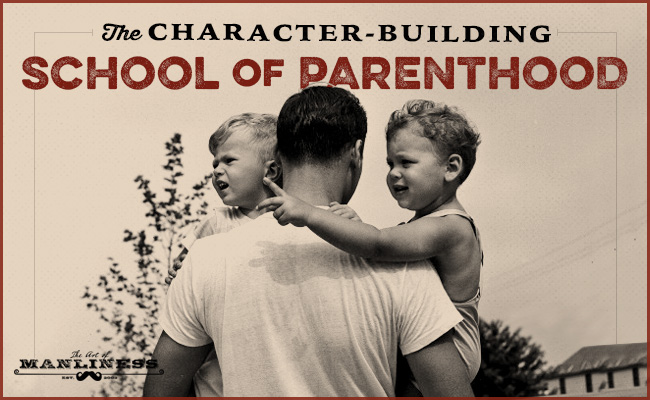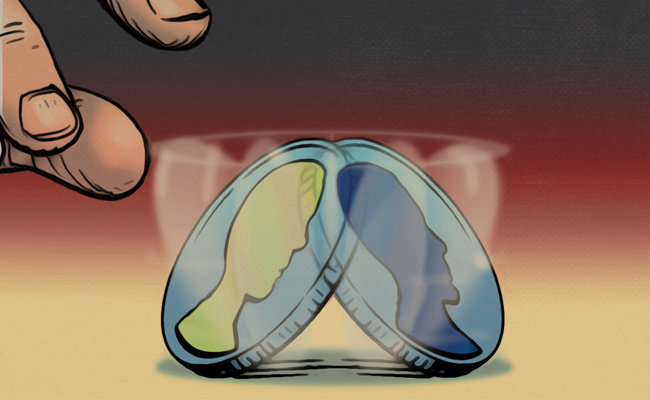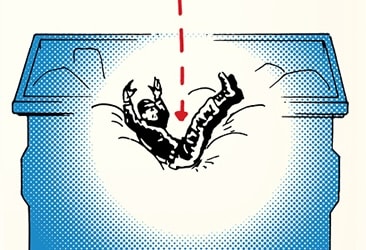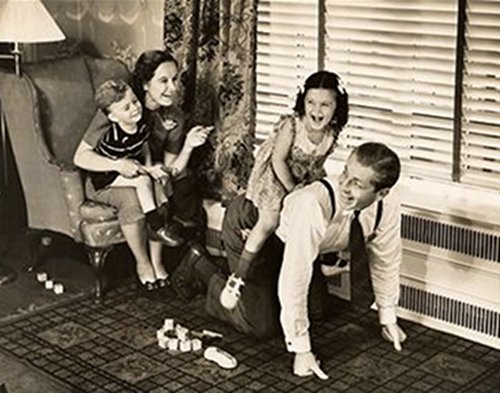
Some people shy away from having kids because they worry that it won’t make them happy.
Whether they’re right or wrong really depends on how you define happiness.
If you define happiness in terms of fun and simple pleasure, then no, parenthood will indeed not make you happy. It adds a heaping helping of responsibility, stress, and friction to life.
But, if you define happiness as the ancients did, as a state of eudemonia, or full human flourishing, in which you hone your capabilities and grow in virtue and excellence, then having children will make you very happy indeed. For it enrolls you in a unique school of character — a training regimen that can sharpen, refine, and expand you.
Now, of course becoming a parent doesn’t do this automatically; plenty of people manage to raise children and still remain terrible human beings. But, if you embrace parenthood as an opportunity to become a better person, if you willingly lean into the friction, it can be incredibly transformative, strengthening a multitude of character traits.
The Character Traits Trained by the School of Parenthood
This list is not exhaustive, at least partially because I myself am an exhausted parent. While a certain amount of delirium can enhance one’s creative faculties, nothing in this exhausted state can really be fully perfect. There are some traits you can and surely will add to this list; parenthood is a school, which like any other, goes through phases, and you’re always learning something new about not only yourself, but your kids, and the world at large as well.
Unlike any other school, though, there’s no graduation. You’ll never toss your mortarboard in the air; only your laughing and giggling toddler. Luckily, it’s a school you’ll never want to graduate from. (You may think you want to in the midst of particularly hard and stressful times, but you’ll always come back to loving the heck out of your kids. I once heard an appropriate anecdote about something an old woman said to a parent trying to wrangle his kids in a store: “It’s perfectly normal and acceptable to want to throw your kids out the window as long as you don’t actually do it.”) You’ll ever stay enrolled in the courses that teach the following traits, and continue your experiments in this incomparable laboratory of love.
Patience. My goodness, the patience. This popped into my head first and foremost for a reason: it’s the trait most needed, exercised, tested, and built up in the character-building school of parenthood. It’s required at all phases: for the baby who’s crying for seemingly no reason, for wiping up inevitable pools of urine during potty training, for tactfully dealing with temper tantrums thrown mid-grocery shopping, for elementary-age kiddos figuring out they can actually break rules, for middle schoolers sneaking phones and tablets up to their room after bedtime, for teenagers talking back . . . the list goes on and on and on.
You’ll learn patience in one area, only for your kiddo to grow up a little bit and test you in another. But ultimately, your capacity for dealing with disappointments and things outside your control, not just regarding parenting but with the world at large, will grow.
Playfulness. This is perhaps the most fun part of parenting — just learning to play with your kids. And it does indeed take some learning. You’ll want to be making dinner, or changing a lightbulb, or doing any number of other chores around the house, but over time, you’ll realize that there’s greater joy to be had in playing catch or flying kites or even reading books than in having a perfectly tidy house. You’ll also learn that the years of your kiddo(s) wanting to play with you are fleeting, so to take advantage of them to the fullest. You’ll have decades later on to have a completely clean house.
Humility. Almost from the second your baby emerges from the womb you’ll realize how imperfect you are, and how unprepared you are for the job of dad. That’s often an excuse for people to wait to have kids (or to not have them at all), but don’t let it be. No first-time parent is ever prepared; in fact I’m not sure it’s possible to be prepared for the world-changing experience of dadhood. You’ll gain confidence over time, sure (more on that below), but you’ll also almost constantly be reminded of the character traits you need to work on — be it your patience, flexibility, sense of humor, etc. Don’t take it as a depressing indictment on your character, but as an admonition to grow.
Confidence. Lo and behold, perhaps much to your and everyone else’s amazement, you can actually care for and raise a human being. You can keep the dang thing alive, and even make it laugh sometimes. You can raise a child who excels in school, is kind and gracious, can start a fire, and maybe even likes dear old Mom and Dad. Certainly not every day will build your confidence (some days will indeed feel disastrous), but over time you’ll realize that if you love your kid(s) to the fullest of your abilities and are doing the best you can with what you’ve got, you’re doing alright.
Improvisation. Nothing will go as planned. Ever. (Okay, maybe that’s hyperbole, but only slightly.) There will always be some catastrophe — whether small or big, either in your eyes or the kiddos’ — that requires improvisational thinking and decision making. A surprise vomiting in the back seat. Forgotten — and crucial — stuffed animals on vacations. A teenager coming in the front door past curfew, and drunk. Parenting is chock-full of “opportunities” (because calling them sh*tshows doesn’t seem appropriate) to make quick decisions and figure things out on the fly. You’ll not only learn to be prepared for any and every possible outcome, but how to improvise when life throws you a curveball you couldn’t have seen coming.
Selflessness. Perhaps the most obvious one, but true nonetheless. From day one of parenthood, you’re getting a crash course in selflessness. You’ll get over yourself — your own wants and desires about how you spend your time and energy and money — real quick. From waking multiple times a night to comfort and feed a crying infant, to shuttling kids to and from school and sports and other extracurricular activities, to much later on, dropping everything and cancelling plans to help care for grandkids when your own children can’t get time off work, you’ll immediately learn there isn’t anything you wouldn’t do for your kids.
Gratefulness. Truly, it takes a village. Without the help of our own parents, friends, neighbors, daycare providers, teachers, random cooing and smiling strangers, we parents would be up a creek. When you realize everything people give on your kids’ behalf — be it time, energy, money, or small gestures of kindness — your general gratefulness skyrockets.
Beyond being grateful for the community around you, you’ll quickly learn that you’re grateful for your children themselves, and how much joy their very existence brings to your life. In the words of Reverend John Ames to his son (via novelist Marilynne Robinson):
“I’m writing this in part to tell you that if you ever wonder what you’ve done in your life, and everyone does wonder sooner or later, you have been God’s grace to me, a miracle, something more than a miracle. You may not remember me very well at all, and it may seem to you to be no great thing to have been the good child of an old man in a shabby little town you will no doubt leave behind. If only I had the words to tell you.”
And from the late Paul Kalanithi to his young daughter in one of my favorite books, When Breath Becomes Air:
“When you come to one of the many moments in life when you must give an account of yourself, provide a ledger of what you have been, and done, and meant to the world, do not, I pray, discount that you filled a dying man’s days with a sated joy, a joy unknown to me in all my prior years, a joy that does not hunger for more and more, but rests, satisfied. In this time, right now, that is an enormous thing.”
Being a parent cultivates your gratefulness in that you come to relish the miracle of life that rests in your arms.
Trust. At some point in a child’s life — whether it’s very early on or once they hit school-age years — you’ll have to entrust their care to someone else. Be it a grandparent or teacher, it’s hard for any parent, every time it happens, to leave their child with another person. You not only have an intrinsic, protective fear, but you also just long to be with them, knowing that their time under your roof is precious and limited.
Beyond that piece of it, you’ll come to learn that you have to trust the kids themselves. Trust in their resilience, their ability to recover from scrapes and bruises — both physical and emotional, their decision making, their choices in friends and significant others.
You have to trust that a parent’s greatest act of love is ultimately to facilitate his child’s burgeoning independence — to eventually make yourself obsolete.
Organization. Perhaps a seemingly minor trait, but having kids will force you to be a bit more organized with your life. Beyond just the obvious things like keeping up with vital records and daily schedules, you’ll also need to stay on top of laundry, dishes, general toy clutter, etc. Your domicile will much more quickly become an intimidating black hole of a mess than it did before. I’m far more willing now to spend 15-20 minutes a day picking up and de-cluttering than I was pre-kiddos.
Adventure. Is there a greater adventure than raising children? I’m not one to generally use dictionary definitions in articles, but it’s so fitting here: adventure is “an unusual and exciting, typically hazardous, experience or activity.” One definition adds “especially the exploration of unknown territory.” If that’s not parenthood, what is?
What we usually think of as an adventure typically has an end date. As a parent though, you’re exploring unknown territory until the day you die.
It’s certainly unusual: babies are strange creatures who morph into unrecognizable, sometimes tornadic toddlers, who eventually morph again into rebellious teenagers, who, hopefully, morph yet again into adults who will come to appreciate all their parents have done.
It’s plenty hazardous too — at least for the heart. There’s not only the terrible, worry-inducing risk of an accident or disease befalling your child, but the chance they’ll turn away from you, ripping that very heart in two.
And as for exciting — the most genuine smiles I’ve ever had have been when my wife and I exchanged vows, and when my children emerged from the womb. No other moments in life are, ahem, as pregnant with possibilities.
Integrity/Virtue. Few things will inspire you to become a better person more than your kids. It happens right away to some extent, but much more so (at least for me) once it’s clear that they are watching you and copying you. As the old poem goes, “A careful man I want to be; a little fellow follows me.” Cut the swearing, lessen the drinking (especially when your kid says “I need a beer!”), show manners and kindness to people, be reliable and do what you say you will (kids have great memories; they won’t forget you promising ______ when you get home). You know, all the things that make you a good human being.
Authority/Assertiveness. If you weren’t an assertive guy before becoming a dad, you’ll find out in short order that it’s time to become one. Kids learn all too quick how to talk back, rebel, and generally do things they shouldn’t really be doing. Sometimes they’re intentionally wreaking havoc, but often they just don’t quite know how the world works and are trying to figure it out. When things get out of hand, though, you can’t just pussyfoot around and cave to their demands. You might think you’re a tough guy, but when your little girl looks at you all doe-eyed, it’ll take more self-control than you originally thought to say no when you need to. If you were once passive, being a parent will push you to learn what it means to cultivate authority and assertiveness. And hopefully in a healthy way — though it does take time to figure out the balance; one of the best pieces of advice my wife and I received as new parents was to learn how to “pick battles that are big enough to matter, small enough to win.”
Sense of Wonder. Wonder is one of the least regarded virtues in our society. The ability to see the world (and its inhabitants for that matter) for the beautiful place it is, is lacking in a culture where complaints are more common than gratitude, and criticism more common than praise. It’s often the natural environment that restores a sense of wonder in a person, but being a parent and watching your kids play and interact with the world can do it on a daily and hourly basis. The joy they get from the smallest things carries over into your own soul; their curiosity piques your own. Even their very development in the things they can do and say and think on their own is a bit awe-inspiring — this thing that was once a little, helpless blob becomes a creative, reflective, autonomous being capable of making a tangible impact on the world. Is anything more wondrous?
Sense of Humor. In addition to cultivating a sense of wonder, being a parent also grows your sense of humor. Or at least it should. There are grumpy parents aplenty, but if they would just learn to laugh at things a bit more, they’d be much better off. If you don’t laugh at a baby releasing his bladder on you and giggling, or at a young girl cutting inches off her own hair, you’re bound to be a curmudgeon. That’s no fun though. I’ve found that amongst most parents, certain situations end up so chaotic and ironic and unplanned that laughter just naturally spills out (even if it’s of a slightly crazed variety).
Beyond this sort of natural silliness of life’s twists and turns, you’ll come to learn that kids are just funny creatures, especially when they start talking and having independent thoughts. The things they do and the things that come out of their mouth will assuredly make you chuckle with delight (even if sometimes you shouldn’t really be laughing — like when a kid swears and has no idea what he just said).
Toughness. Being a parent is a hard business. It’s okay to admit that. Sleeplessness, illness, short fuses — every phase of parenting is rife with opportunity for mental and physical breakdowns. But ultimately you just have to make it through; you will, eventually, make it to the dawn of another day. While plenty of activities will build your physical toughness more than parenting (though it does tend to teach you that you can actually function on less sleep than you originally thought), few things build up one’s mental toughness and resilience more than being a parent. You’ll learn to fight fatigue, worry, uncertainty, and your own shortcomings. I’m a far tougher human now than I was before my kids came along. I can deal with sleep interruptions, with plans gone awry, with not getting what I want, with bodily fluids on my furniture, floor, and person. You’ll quickly learn to do the same.
Flexibility. Also known as go-with-the-flow-fulness. Whereas improvisation is about finding solutions and troubleshooting, flexibility is about mentally recalibrating — about not getting super flustered or annoyed — when things don’t quite go according to plan, which, as you’ll remember, happens with regularity.
I’m a guy who thrives on routine. I get up and go to bed at about the same time every day, I eat meals at about the same time, I often plan my weekends to the hilt.
Enter the baby bomb.
It will go off right in the middle of your routinized life. And then when things seem to settle in, and you think you have a new, post-child routine finally nailed down, the baby or kid will change things up either by getting sick, or by getting you sick, or by suddenly deciding to alter their sleep schedule.
Flexibility is the name of the game when you’re a parent, and you will be forced to cultivate yours. While there’s a lot you can do to create a good routine for your kiddo(s), sometimes it just won’t work out the way you planned and you’ve just got to roll with the punches.
Meaning. When you become a parent, you’ll naturally start to think more about the idea of meaning. What am I here for? What’s my purpose? In which direction am I heading? When you turn 30, and your second child — a perfect little daughter — happens to be born on the day you turn 30 (yes, that’s me!), you really start to think about the meaning and direction of your life. It’s a question I’ve been turning over in my mind and in my heart a lot since she was born a couple months ago.
No matter your position in life — CEO, cubicle automaton, day laborer, stay-at-home dad, entrepreneur, freelancer, trade worker, unemployed — it’s very possible, perhaps even probable, that your greatest, most important role in life will be that of parent. Of provider. Of protector. Of wisdom-purveyor. What that looks like can vary widely from man to man, but have no doubt that raising and loving your children well is one of the most significant things you will do in life.
Think about the outsized impact your own childhood had on you — for good or ill. Parents make a big difference.
It’s hard to realize in the daily, hard moments of parenting, but your child will be influenced by how you loved and cared for them on a day-to-day basis. If you’re a parent, and wondering what your purpose on this planet is, look first to the little ones (or perhaps not-so-little ones) sleeping under your roof.






